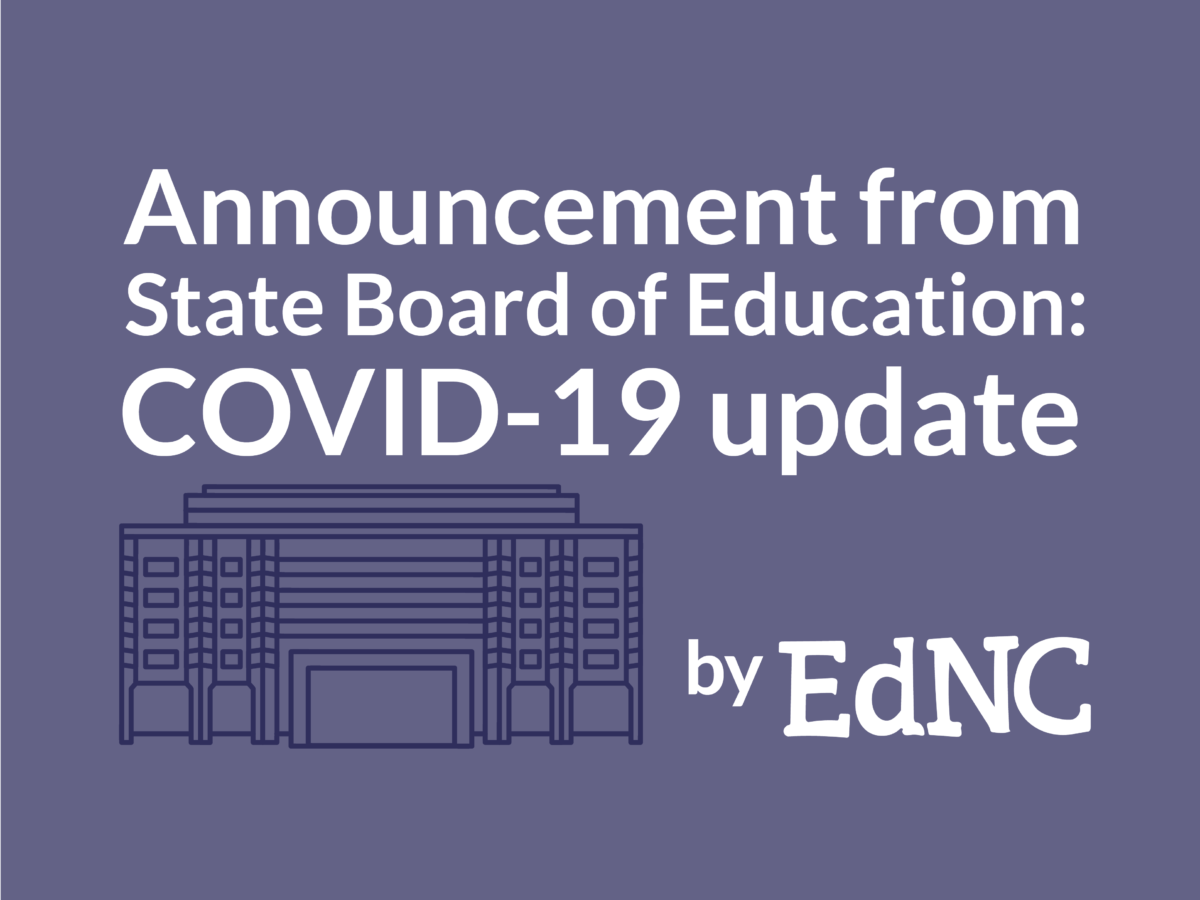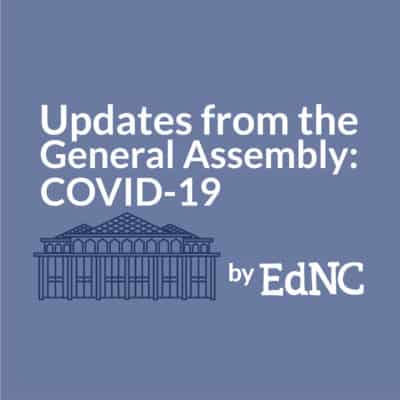

The landscape for student grades is changing this spring semester after the State Board of Education voted to pass new guidance today in reaction to a pandemic-spurred move to remote learning.
Students in elementary school will receive no final grades under the plan passed today. Instead, teachers will provide year-end feedback to students.
“Teachers will document individual strengths and needs from both an academic and social/emotional perspective,” said Sneha Shah-Coltrane, director of advanced learning and gifted education at the state Department of Public Instruction (DPI), adding later: “We believe this is absolutely critical, because we don’t understand what is happening in every student’s environment.”
Students in middle school will receive a pass or withdrawal for each course. The withdrawal will go to those students who were not passing the course as of March 13, but it does not equate to a failing grade.
High school students in grades nine through 11 will have the option of either getting the numerical grades they had as of March 13 or “as it improved through the semester as remote learning continued,” or they can get a pass or withdrawal. A withdrawal does not count as a failing grade, but the student will not get a course credit. If a student chooses a numerical grade, that will be factored into their GPA, while a pass or withdrawal will not.
The Board voted on grading guidance in March, but vowed to revisit the policies as the situation changed on the ground and more was learned about the impacts of remote learning on students.
The guidance around seniors remains the same as it was in March — they will get a pass or withdrawal for the spring semester depending on their grades up to March 13, with the chance to improve failing grades via remote learning. Revisions to the policy regarding seniors may be taken up again in the future with the aim of addressing the request of some Board members that seniors be given the option to have a numerical grade if they want one.
Under these new rules, promotion or retention of a student remains the purview of the school principal and/or staff. DPI is recommending that students only be considered for retention if they were already being considered for it as of March 13.
While there is a plan in place, Shah-Coltrane and others emphasized the fact that it is not perfect.
“There is no grading policy that will solve issues of inequities that typically exist in our communities and schools,” Shah-Coltrane said. “It is very important that we remember that.”
The Board also voted on new policies for teacher evaluation in the time of COVID-19. For teachers who had all required observations up to or before March 13, and for whom the other required evaluative steps can be conducted virtually and effectively, the normal process will be followed. If that’s not the case, then required observations “shall be abandoned and no summative ratings shall be entered into the NCEES system.” NCEES is the North Carolina Educator Evaluator System.
Tom Tomberlin, director of district human capital at the state Department of Public Instruction, said the evaluation process has been carefully designed to be valid and reliable, and that includes a certain number of observations. However, since schools closed March 13, not all observations were made for all teachers.
“Can these observations be conducted virtually?” he asked. “In this guidance, we answer that question: ‘No.’”
Additionally, the most recent rating for teachers who did not get a summative evaluation this school year will be used for things like licensure renewals.
Here are the recommendations in full.
Finally, with the short session of the General Assembly starting next week, the State Board looked at its legislative requests, including $380 million in funding requests for a number of areas impacted by COVID-19.
Among the big-ticket items are $56 million for school nutrition, $21.6 million for supplemental pay for child nutrition and transportation employees, $21.2 million for connectivity, $91.5 million for digital devices for students, $55 million for student reentry resources for student physical and mental health, and $70 million for the Summer Bridge/Jump Start program.
The last is a program for disadvantaged students to help them make progress in reading proficiency over the summer.
Here is a full list of legislative asks.
House education working group moves forward legislation to address COVID-19
The funding requests from the State Board and the state Department of Public Instruction were presented to the education working group of the House Select Committee on COVID-19 today. Rep. John Fraley, R-Iredell, a chair of the working group, said that no appropriations are included in the bill coming out of the group. The presentations seen in the working group on appropriation requests will, instead, go to House leadership.
“Once the work is done within House leadership, there will be a consensus formed between the House, the Senate, and the governor about how to appropriate these dollars, which will all be federal dollars,” he said.
From there, any appropriations will be put into an overall appropriations bill, which will be paid for using federal money given to the state as part of the Coronavirus Aid, Relief, and Economic Security (CARES) Act. North Carolina has already received more than $2 billion as part of that legislation, according to State Treasurer Dale R. Folwell. That is money that can be used by the legislature to combat impacts related to COVID-19. Overall, the state is supposed to receive more than $4 billion from the federal government to be used by the legislature.
During the presentation on legislative requests, Eric Davis, chair of the State Board of Education, said that the state is trying to figure out measures that will be needed for schools to open in August. These include items like how students can social distance safely.
Additionally, the working group finalized and approved legislation related to COVID-19 education impacts.
The working group has been discussing for weeks legislative changes that would need to be made given the fact that schools are not meeting in-person. Included in the legislation is language that would take care of the requirements related to testing, school performance grades, the Innovative School District, summer reading camps, third-grade retention, educator preparation program requirements, teacher licensure, and more. The bill also delays the implementation of K-3 class size restrictions by a year. Read our previous coverage of some of these recommendations here and here.
Here is the overview document.
Additionally, the legislation voted on today includes language related to calendar flexibility. Under the legislation, schools would be allowed to start in the fall as early as August 17. Ordinarily, schools can start no earlier than August 24. The Jump Start program — part of DPI’s budget request — could start two weeks earlier than August 17. The legislation would also allow remote learning to satisfy requirements related to instructional days.
“The calendar and the Jump Start are still somewhat works in progress,” Fraley said. “We’ve been working back and forth with the Senate over both of these things. I think we are reasonably close in theory as to where we want to go with that.”
Here is the draft legislation approved by the working group today.




